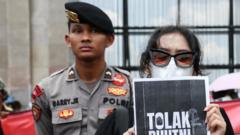The new amendments have raised alarms among activists, fearing a return to past authoritarian rule under Suharto.
**Controversial Military Legislation Sparks Protests in Indonesia**

**Controversial Military Legislation Sparks Protests in Indonesia**
Indonesia's parliament has approved changes allowing military personnel a larger role in government, igniting widespread unrest.
In a contentious move that has sparked significant protests, Indonesia's parliament has passed new legislation enabling the military to assume greater roles within the government. This development has drawn harsh criticism, with many activists fearing it could herald a return to the oppressive military dictatorship that beset the country during Suharto's regime, which lasted from 1966 until his ousting in 1998.
The revisions, which received backing from President Prabowo Subianto—a former special forces commander and Suharto’s son-in-law—will permit active military officers to hold positions in government without the requirement to retire or resign from their military roles. Since the announcement of these changes, hundreds of pro-democracy activists have gathered outside the parliament building to protest, signaling a strong public discontent with the new policies.
Wilson, an activist from the Indonesian Association of Families of the Disappeared (KontraS), expressed serious concerns about the implications of this legislation. "The essence of democracy is that the military should not engage in politics. The military should only manage barracks and national defence," he stated. The amendments expand the number of civilian institutions that active military personnel can engage with from 10 to 14 and extend the retirement age for most ranks, allowing four-star generals to serve until the age of 63.
The protest crowd has swelled to nearly a thousand, brandishing banners declaring, "Return the military to the barracks!" and "Against militarism and oligarchy." With reports indicating that prior to the revisions, nearly 2,600 active-duty officers were already serving in civilian positions, some observers express concern that this legislation further consolidates military influence over government.
Dedi Dinarto, lead analyst at public policy advisory firm Global Counsel, argued that these changes represent a broader consolidation of power under President Prabowo. This is particularly troubling given that the main opposition party supported the legislation, which could indicate a shift toward prioritizing state control and stability at the expense of democratic principles and civil liberties.
Many Indonesians view President Prabowo with skepticism due to his association with the authoritarian era, having led a special forces unit accused of serious human rights violations during the late 1990s. The President has already shown a tendency to expand military involvement in public initiatives, demonstrated by a recent $4 billion nutritional program for children and pregnant women supported logistically by the armed forces.
As the government defends these amendments on the grounds of evolving geopolitical landscapes and military technology, critics urge caution. Virdika Rizky Utama, a researcher at PARA Syndicate, remarked on the potential conflict of interest posed by allowing active-duty officers to hold judicial roles, stating, "If the military gains influence over the justice system, who will hold them accountable?"
Human Rights Watch's Andreas Harsono echoed these sentiments, reinforcing concerns that the amendments undermine the government's commitment to human rights and accountability. "President Prabowo appears intent on restoring the Indonesian military's role in civilian affairs, which were long characterised by widespread abuses and impunity," he warned.
In response to the passage of the law, activists assert that their struggle will persist. Sukma Ayu, a university student from Jakarta, declared resolutely, "This long struggle cannot stop just because the law has been passed. There is only one word: Resist. We will continue protesting until we claim victory."
The revisions, which received backing from President Prabowo Subianto—a former special forces commander and Suharto’s son-in-law—will permit active military officers to hold positions in government without the requirement to retire or resign from their military roles. Since the announcement of these changes, hundreds of pro-democracy activists have gathered outside the parliament building to protest, signaling a strong public discontent with the new policies.
Wilson, an activist from the Indonesian Association of Families of the Disappeared (KontraS), expressed serious concerns about the implications of this legislation. "The essence of democracy is that the military should not engage in politics. The military should only manage barracks and national defence," he stated. The amendments expand the number of civilian institutions that active military personnel can engage with from 10 to 14 and extend the retirement age for most ranks, allowing four-star generals to serve until the age of 63.
The protest crowd has swelled to nearly a thousand, brandishing banners declaring, "Return the military to the barracks!" and "Against militarism and oligarchy." With reports indicating that prior to the revisions, nearly 2,600 active-duty officers were already serving in civilian positions, some observers express concern that this legislation further consolidates military influence over government.
Dedi Dinarto, lead analyst at public policy advisory firm Global Counsel, argued that these changes represent a broader consolidation of power under President Prabowo. This is particularly troubling given that the main opposition party supported the legislation, which could indicate a shift toward prioritizing state control and stability at the expense of democratic principles and civil liberties.
Many Indonesians view President Prabowo with skepticism due to his association with the authoritarian era, having led a special forces unit accused of serious human rights violations during the late 1990s. The President has already shown a tendency to expand military involvement in public initiatives, demonstrated by a recent $4 billion nutritional program for children and pregnant women supported logistically by the armed forces.
As the government defends these amendments on the grounds of evolving geopolitical landscapes and military technology, critics urge caution. Virdika Rizky Utama, a researcher at PARA Syndicate, remarked on the potential conflict of interest posed by allowing active-duty officers to hold judicial roles, stating, "If the military gains influence over the justice system, who will hold them accountable?"
Human Rights Watch's Andreas Harsono echoed these sentiments, reinforcing concerns that the amendments undermine the government's commitment to human rights and accountability. "President Prabowo appears intent on restoring the Indonesian military's role in civilian affairs, which were long characterised by widespread abuses and impunity," he warned.
In response to the passage of the law, activists assert that their struggle will persist. Sukma Ayu, a university student from Jakarta, declared resolutely, "This long struggle cannot stop just because the law has been passed. There is only one word: Resist. We will continue protesting until we claim victory."




















